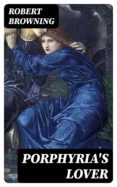PORPHYRIA'S LOVER de ROBERT BROWNING
Ficha técnica
- PORPHYRIA'S LOVER
- ROBERT BROWNING
- Idioma: INGLÉS
- Formatos: Pdf, ePub, MOBI, FB2
- ISBN: 8596547007258
- Editorial: DIGICAT
Ebook para Android descarga gratuita PORPHYRIA'S LOVER de ROBERT BROWNING PDF CHM en español
Overview
"Porphyrias Lover" is Brownings first ever short dramatic monologue, and also the first of his poems to examine abnormal psychology. In the poem, a man strangles his lover – Porphyria – with her hair. Porphyrias lover then talks of the corpses blue eyes, golden hair, and describes the feeling of perfect happiness the murder gives him. Although he winds her hair around her throat 3 times to throttle her, the woman never cries out. The poem uses a somewhat unusual rhyme scheme: A,B,A,B,B, the final repetition bringing each stanza to a heavy rest. Robert Browning (1812–1889) was an English poet and playwright whose mastery of dramatic verse, and in particular the dramatic monologue, made him one of the foremost Victorian poets. His poems are known for their irony, characterization, dark humor, social commentary, historical settings, and challenging vocabulary and syntax. The speakers in his poems are often musicians or painters whose work functions as a metaphor for poetry. "Porphyrias Lover" is Brownings first ever short dramatic monologue, and also the first of his poems to examine abnormal psychology. In the poem, a man strangles his lover – Porphyria – with her hair. Porphyrias lover then talks of the corpses blue eyes, golden hair, and describes the feeling of perfect happiness the murder gives him. Although he winds her hair around her throat 3 times to throttle her, the woman never cries out. The poem uses a somewhat unusual rhyme scheme: A,B,A,B,B, the final repetition bringing each stanza to a heavy rest.


0コメント